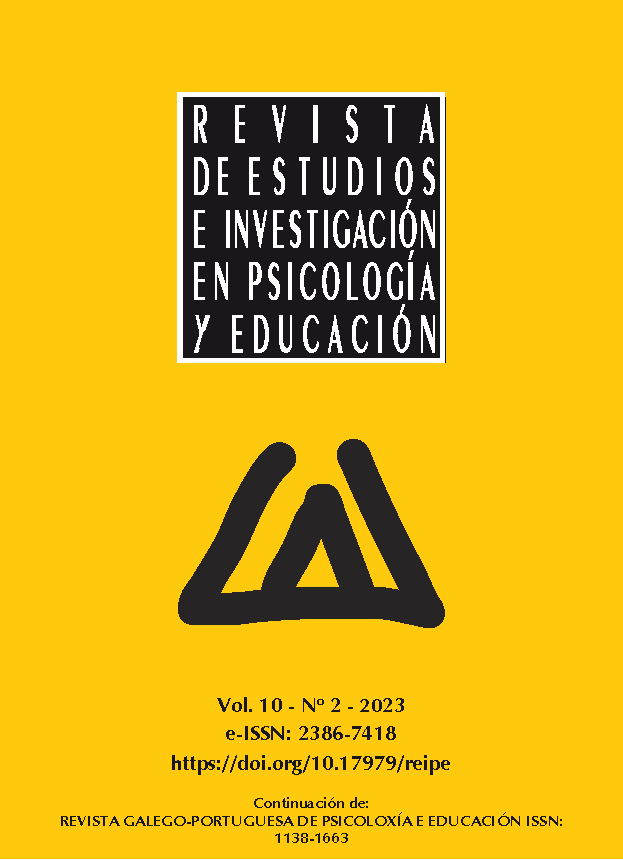Necesidades formativas de docentes de educación primaria para la prevención del suicidio
Contenido principal del artículo
DOI:
https://doi.org/10.17979/reipe.2023.10.2.9558Resumen
El suicidio es un problema de salud que afecta a la población infantil y adolescente y que debe ser abordado desde todas las direcciones, incluida la escuela. Por ello, el objetivo de este estudio es explorar las necesidades de formación de docentes de educación primaria para apoyar la prevención del suicidio en las escuelas. Los datos para el estudio se recogieron a partir de una serie de entrevistas semiestructuradas con una muestra no probabilística de 31 docentes de enseñanza primaria de Cuba que tuvieron experiencias de estudiantes con intentos de suicidio, y se procesaron utilizando el análisis de contenido Atlas.ti 9. Los resultados revelan un conocimiento insuficiente sobre las causas de los intentos de suicidio, los signos de riesgo de la conducta suicida y el papel del profesorado en la prevención. Las deficiencias observadas en relación con la ejecución de acciones preventivas se atribuyen a la ausencia de protocolos establecidos, la presencia de mitos en torno al tema y las limitadas habilidades y conocimientos por parte de las y los docentes. El artículo concluye recomendando más investigación sobre el tema, y cursos de formación para profesores dirigidos a la identificación de alumnado de riesgo, el seguimiento de estudiantes con conductas suicidas, la promoción y facilitación de la prevención grupal dentro de la escuela, y el asesoramiento familiar.
Palabras clave:
Descargas
Detalles del artículo
Referencias
ARRIETA DE ÁVILA, Karen; JIMÉNEZ BALLESTEROS, Daniela; MARTÍNEZ SALCEDO, Sharon; RODRÍGUEZ BETTÍN, Silvana; & SÁNCHEZ ESTÉVEZ, María José (2021). Creencias, actitudes e intervenciones psicoeducativas frente al suicidio en el contexto educativo: una revisión de la literatura. Tejidos Sociales, 3(1), 1-12. Disponible en: https://revistas.unisimon.edu.co/index.php/tejsociales/issue/view/252
Asociación Argentina de Prevención del Suicidio (2009). Cartilla de orientación y prevención del suicidio. Disponible en: https://infanciayjuventudsc.wordpress.com/2011/06/10/cartilla-de-orientacion-y-prevencion-del-suicidio-fuente-asociacion-argentina-de-prevencion-del-suicidio/
BLAKE, Oscar Juan (2006). Origen, detección y análisis de las necesidades de capacitación (2 ed.). Ediciones Macchi.
CARMONA-PARRA, Jaime Alberto; JARAMILLO ESTRADA, Juan Carlos; TOBÓN HOYOS, Felipe; & AREIZA SÁNCHEZ, Yuliana Andrea (2012). Manual de prevención del suicidio para instituciones educativas. ¿Qué hacer en casos de suicidio consumado, intento de suicidio o ideación suicida de nuestros estudiantes? Fundación Universitaria Luis Amigó, Universidad de San Buenaventura, Colciencias.
CORONA-MIRANDA, Beatriz; ALFONSO SAGUÉ, Karen; PRADO RODRÍGUEZ, Ramón; HERNÁNDEZ SÁNCHEZ, Mariela; CUELLAR LUNA, Liliam; & GÁMEZ SÁNCHEZ, Donelia (2021). Estratificación epidemiológica de riesgo del intento suicida en Cuba. Revista Cubana de Medicina General Integral, 37(2), e1296. https://revmgi.sld.cu/index.php/mgi/article/view/1296
DIZ-LÓPEZ, María Julia. (2017). Necesidades formativas. Modelos para su análisis y evaluación. Revista de Estudios e Investigación en Psicología y Educación, Extr(06), 006-010. https://doi.org/10.17979/reipe.2017.0.06.2132
HATTON, Victoria; HEATH, Melissa A.; GIBB, Gordon S.; COYNE, Sarah M.; HUDNALL, Greg; & BLEDSOE, Cathy (2017). Secondary teachers’ perceptions of their role in suicide prevention and intervention. School Mental Health, 9, 97-116. https://doi.org/10.1007/s12310-015-9173-9
MARRACCINI, Marisa E.; GRIFFIN, Dana; O'NEILL, J. Conor; MARTINEZ JR, Robert R; CHIN, Andrew J.; TOOLE, Emily N.; GRAPIN, Sally L.; & NASER, Shereen C. (2021). School risk and protective factors of suicide: A cultural model of suicide risk and protective factors in schools. School Psychology Review. 51(3), 266-289. https://doi.org/10.1080/2372966X.2020.1871305
MARTÍN GONZÁLEZ, Reinier; FERRER-LOZANO, Dunia Mercedes; & MACHADO-RIVERO, Manuel Osvaldo. (2020). Revisión sistemática sobre conducta suicida en niños menores de 12 años en Cuba. Revista Cubana de Medicina General Integral, 36(2), e1079. https://revmgi.sld.cu/index.php/mgi/article/view/1079
MARTÍN-GONZÁLEZ, Reinier; MARTÍNEZ-GARCÍA, Laidy; & FERRER-LOZANO, Dunia Mercedes. (2017). Funcionamiento familiar e intento suicida en escolares. Revista Cubana de Medicina General Integral, 33(3), 281-295. https://revmgi.sld.cu/index.php/mgi/article/view/345
Ministerio de Salud Pública de Cuba (2021). Anuario Estadístico de Salud 2021. Dirección de Registros Médicos y Estadísticos de Salud. Disponible en: https://temas.sld.cu/estadisticassalud/2022/10/18/anuario-estadistico-de-salud-2021/
MOSQUERA, Laura. (2016). Conducta suicida en la infancia. Una revisión crítica. Revista de Psicología Clínica con Niños y Adolescentes, 3(1), 9-18. Disponible en: https://www.revistapcna.com/es/contenido/43
OLMEDO-CASAS, Karina; & PEINADO-DE-BRICEÑO, Sofía. (2007). Necesidades formativas del profesorado en las tecnologías de información y comunicación. Laurus, 13(24), 93-111. http://www.redalyc.org/articulo.oa?id=76111485005
Organización Mundial de la Salud (2001). Prevención del Suicidio. Un instrumento para docentes y demás personal institucional. Fundación Intras https://apps.who.int/iris/handle/10665/66802
Organización Mundial de la Salud (2021). Suicidio. Nota Informativa. https://www.who.int/es/news-room/fact-sheets/detail/suicide
Organización Panamericana de la Salud (2016). Prevención de la conducta suicida. Autor. https://iris.paho.org/handle/10665.2/31167
Organización Panamericana de la Salud (2021). Vivir la vida. Guía de aplicación para la prevención del suicidio en los países. Autor. https://doi.org/10.37774/9789275324240
PERDOMO, Mireisys; GÓMEZ, Frank Yudier; & GÓMEZ, Catalina Virgen (2017) Una mirada pedagógica a la prevención de los intentos suicidas. Revista Cognosis, 2(2). https://doi.org/10.33936/cognosis.v2i2.777
PÉREZ-BARRERO, Sergio Andrés (1999). El suicidio, comportamiento y prevención. Revista Cubana de Medicina General Integral, 15(2), 196-217. http://scielo.sld.cu/scielo.php?script=sci_arttext&pid=S0864-21251999000200013&lng=es&tlng=es
ROSS, Victoria; KÕLVES, Kairi; & DE LEO, Diego (2017). Teachers perspectives on preventing suicide in children and adolescents in schools: A qualitative study. Archives of Suicide Research, 21(3), 519-530. https://doi.org/10.1080/13811118.2016.1227005
SALAS-MADRIZ, Flora Eugenia (2019). Formación profesional en el campo de la Educación en el contexto actual: Aristas y puntos ciegos. Revista Actualidades Investigativas en Educación, 19(2), 1-25. https://doi.org/10.15517/aie.v19i2.37024
VEGA-CHACÓN, Reynaldo (2017). La prevención de la conducta suicida. Una mirada desde la psicología educativa. Alternativas cubanas en psicología, 5(13), 60-75.
WESTEFELD, John S.; JENKS KETTMANN, Julie D.; LOVMO, Carolyn; & HEY, Clare (2007). High School suicide: Knowledge and opinions of teachers. Journal of Loss and Trauma, 12(1), 33-44. https://doi.org/10.1080/15325020600757839



